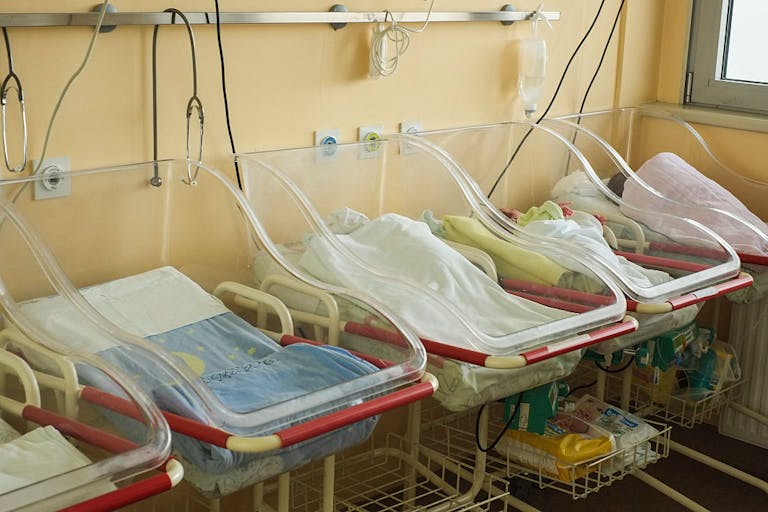
Japan looks to increase its population as birth rate falls
Nancy Flanders
·
Issues·By Anne Marie Williams, RN, BSN
No, economic factors aren’t the main cause of falling US birth rates
A recently-published paper in the Journal of Economic Perspectives pushes back against the common claim that economic factors — like the cost of child care or student loan debt, or even financial fallout from COVID-19 — are the most likely and significant cause for America’s abysmal, continually decreasing birth rates.
In the abstract, the authors observe that given a “widespread” and continuous decline “across demographic subgroups,” even after the early 2010s recovery from the Great Recession which should have triggered a rise in birth rates but did not, the “dominant” explanation is reportedly “likely to be multifaceted or society-wide” rather than primarily economic in origin.
The authors also suggest “perhaps the key explanation for the post-2007 sustained decline in US birth rates is not about some changing policy or cost factor, but rather shifting priorities across cohorts of young adults” (emphasis added). The authors’ straightforward conclusion about the downward demographic spiral is concerning, as they claim to “see no indication in the data that there is likely to be a reversal of these trends in the near future.”
Ethics and Public Policy Center’s Patrick Brown comments in his analysis of the paper that “Despite changes in economic conditions, as well as policy changes to Medicaid coverage, abortion access, comprehensive sex education laws, and other shifts, [the researchers found] very little impact on birth rates.” He believes that blaming falling birth rates on primarily economic factors is incorrect in part because “American incomes are at record highs, and standards of living are better than they were in decades past.” For this reason, “Assuming would-be parents are opting out of having kids exclusively because of financial pressures misunderstands the dynamic at play.”
Article continues below
Dear Reader,
Have you ever wanted to share the miracle of human development with little ones? Live Action is proud to present the "Baby Olivia" board book, which presents the content of Live Action's "Baby Olivia" fetal development video in a fun, new format. It's perfect for helping little minds understand the complex and beautiful process of human development in the womb.
Receive our brand new Baby Olivia board book when you give a one-time gift of $30 or more (or begin a new monthly gift of $15 or more).
READ: Elon Musk says low birth rates are one of the ‘biggest risks to civilization’
Brown argues instead that the opportunity cost of parenting, meaning decreased or delayed “income, education, experiences, or career opportunities” for individuals who become parents, is a more likely driver of falling birth rates than out-of-pocket costs like the relatively small cost of diapers or even the much larger cost of child care. Brown summarizes, “This will require a different way of thinking about family policy than assuming a few extra thousand dollars in a child tax credit will be enough to reverse slumping birth rates.”
A look around at popular culture would appear to confirm Brown’s assertions and the researchers’ findings. As just one example, many young people believe climate change and overpopulation (even though demographic decline – not overpopulation – is the reality across the Western world) pose a threat to the future of our planet, and even call the decision to forego having children an “act of love.” Then, too, a society not only views children as valuable and worth having only if they are wanted but furthermore turns them into a commodity that can be bought and sold. When parenthood is viewed as just another lifestyle choice among many, men and women will be increasingly disincentivized to make that choice. After all being a “plant parent” or a “pet parent” is far cheaper, and has negligible impact on one’s “income, education, experiences, or career opportunities.”
“Like” Live Action News on Facebook for more pro-life news and commentary!
Live Action News is pro-life news and commentary from a pro-life perspective.
Contact editor@liveaction.org for questions, corrections, or if you are seeking permission to reprint any Live Action News content.
Guest Articles: To submit a guest article to Live Action News, email editor@liveaction.org with an attached Word document of 800-1000 words. Please also attach any photos relevant to your submission if applicable. If your submission is accepted for publication, you will be notified within three weeks. Guest articles are not compensated (see our Open License Agreement). Thank you for your interest in Live Action News!

Nancy Flanders
·
Politics
Bridget Sielicki
·
Issues
Sheena Rodriguez
·
Guest Column
Right to Life UK
·
Issues
Bridget Sielicki
·
International
Cassy Cooke
·
Human Interest
Anne Marie Williams, RN, BSN
·
Issues
Anne Marie Williams, RN, BSN
·
Analysis
Anne Marie Williams, RN, BSN
·
Analysis
Anne Marie Williams, RN, BSN
·
Issues
Anne Marie Williams, RN, BSN
·